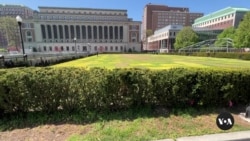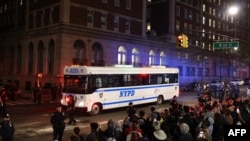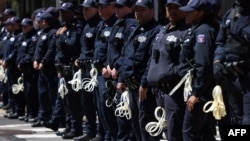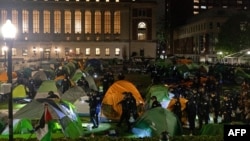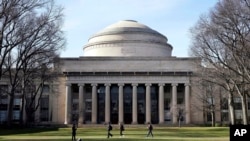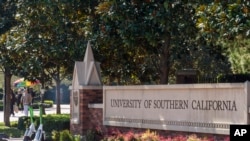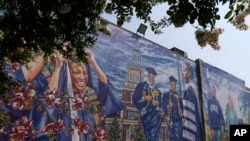Student Union
Columbia University student journalists had an up-close view for days of drama
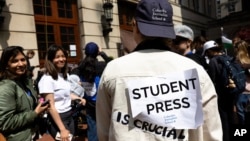
Student journalists on the Columbia University campus knew what was coming long before police with riot shields arrived to begin arresting the pro-Palestinian protesters.
They had watched the situation spiral as the protesters stood their ground, refusing to abandon Hamilton Hall and using a pulley system to bring supplies into the building they had occupied.
The reporters, working for university and online U.S. and international publications, suspected negotiations with administrators were going nowhere when the protesters began donning COVID-era masks to hide their identities. Some began sleeping on the floor in journalism classrooms or offices out of fear of missing something.
But when a journalism professor began writing the phone number to call if they were arrested in permanent marker on their arms, that was the moment it became clear: They were capturing history.
The police operation Tuesday night that cleared out Hamilton Hall capped two weeks of drama over the protests at Columbia, which student journalists at the Ivy League school lived through as they were covering it.
Other media were being kept off campus, so these reporters were the only ones who could capture what was happening.
"I just woke up and I was like, I'm going to go and take some pictures," said Seyma Bayram, a Columbia journalism fellow focused on creating a longform investigative podcast unrelated to the protests.
The encampments were a visual feast. There were musical performances, students reading and helping each other write papers for their classes. She wanted to document it all.
By Monday, students were facing suspension if they didn't leave. Crowds marched around the encampment chanting. Students were given written notices from the administration, warning them to go. They ripped them up, dumped them in trash bins. Rumors were flying.
That night, Bayram was unwilling to go home, sleeping on her office floor.
"How," she wondered, "are they going to remove the students. They're not leaving."
By Tuesday, she was exhausted. The student reporters charged their cameras and other gear and waited.
Many protesters were starting to leave, recalled Shayeza Walid, a graduate journalism student at Columbia, who covered the arrests for the news website Al-Monitor.
The sun was setting as they held hands and chanted, knowing they faced academic repercussions by remaining. Many had given up covering their faces by now, Walid said.
To her, the chants sounded like a hymn and she saw the protesters, some clad in Palestinian keffiyehs, crying. She doubts she will ever forget it.
"It felt so both inspirational and devastating because these were the kids who were willing to get arrested," she recalled.
And then police started assembling outside, setting up barricades. Even on campus, Bayram could tell by the photos posted on social media that police action was imminent. And then the police were there.
"I don't know, it was just like all of a sudden there were just like police, ... riot gear everywhere," Bayram said.
The student journalists were walking backward, filming as they went, Bayram said.
She was pushed off campus. Police buses and officers were everywhere. Around her, people were being arrested.
"Those of us who are pushed out, like student reporters and faculty, I think we were just all horrified that no press was present outside of, or inside of, Hamilton Hall," Bayram said.
Walid recalled that the reporters paired up for safety. Her partner, an international student, had never seen so many police in one place. "And frankly, I hadn't either," Walid said.
She said the police also seemed shocked when they came into campus and saw how few students were left. "It was very evidently disproportionate from where we were standing," she said.
Before the arrests, protesters inside the campus used a megaphone to lead those protesting outside in chants, recalled Cecilia Blotto, a graduate journalism student, who has been publishing photos and video to Uptown Radio, a project of the university's journalism program.
"Columbia, you are a liar," she recalled them chanting, along with "Disclose, divest! We will not stop, we will not rest."
Then Blotto saw police buses pull up, officers exiting with shields and zip ties. Then they played a recording saying that if the protesters didn't disperse they would be arrested.
"People were like being dragged out on the street, with like four cops holding a leg and an arm each. I saw some really, like, striking images of people, like, yelling shame at the cops, while they were dragging out students," Blotto said. She tried to film it all.
Emily Byrski, a graduate student who had a phone number written on her arm in case she was arrested, said the students weren't totally unprepared. There had been a training session.
Still, she said, there had been so many false alerts.
"It's like the boy who cried wolf. Like, there were two or three nights here where we were told, there was a rumor going around that the NYPD was coming, please come to campus," she recalled.
Byrski had knee surgery earlier in the year, so was unable to run as police descended. She limped along with her buddy.
"So we're sort of seeing this all happen from inside and trying to document it as the NYPD is grabbing people, like shoving them to the ground. It was pretty horrifying to see, like, right a foot away from me," Byrski said.
She said she has seen professors cry over the last week. She is pondering it all, uncertain what to make of it.
"I'm just sort of in shock," Byrski said. "I think we all kind of were in shock."
See all News Updates of the Day
Malaysian official: Schools can’t turn away from global tensions
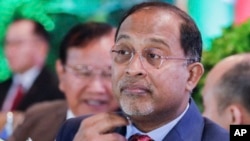
Zambry Abdul Kadir, Malaysia’s higher education minister, said protests spreading across universities in the United States show that schools can’t ignore political tensions.
Helen Packer, reporting in Times Higher Education, said the minister reminded educators that universities are key in the development of leaders, individuals and societies. (April 2024)
Social media breaks are difficult, but necessary

Between online classes, maintaining social connections and working on projects, college students can have a hard time disengaging from the demands of technology.
In Florida International University’s PantherNOW, Ariana Rodriguez offers strategies for taking a break from social media. (April 2024)
- By Melos Ambaye
Many master's degrees aren't worth the investment, research shows
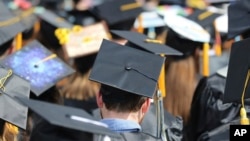
Nearly half of master's degrees have a negative financial return, according to new research by the Foundation for Research on Equal Opportunity, an economic research organization.
The study indicates that many graduate degree programs do not increase lifetime earnings enough to be worth it.
While 23% of bachelor’s degree programs yield a negative financial return on investment, 43% of two-year degrees and master’s degrees fail to deliver a return, according to the study by Preston Cooper, a senior fellow at FREOPP.
Cooper assessed the return on investment for 53,000 degree and certificate programs to determine whether a student’s lifetime earnings outweigh program costs and the risk of not completing their degree.
His findings show that a student’s field of study was the overriding indicator of return on investment at the undergraduate and graduate level.
Engineering, computer science and nursing bachelor’s degrees have high financial returns on investment, while programs in education, fine arts, psychology and English usually have low returns.
Graduate degrees in medicine and law tend to have strong payoffs. But a large share of master’s programs, including the MBA, frequently have low payoffs, according to Cooper.
Although workers with master’s degrees earn 16% more than those with only bachelor’s degrees, Cooper says the figure fails to account for students who had “higher preexisting earnings potential.”
“MBA students typically have high preexisting earnings potential, having often chosen high-ROI undergraduate majors such as finance and economics,” Cooper writes. “So the MBA adds little value on top of that.”
The study indicates that high starting salaries are predictors of high returns on investment. Degrees with starting salaries of $57,000 a year or more deliver the best lifetime returns.
But the return on investment of a degree can vary depending on the educational institution.
“Students interested in fields with low average pay can still find some schools that do well transforming those fields of study into high-paying careers,” Cooper writes.
The quality of an institution also matters, said William Tierney, professor emeritus of higher education at the University of Southern California.
“An MBA from Harvard is a likely ticket to a good job,” Tierney told VOA. “An MBA from the University of Phoenix, less so.”
But students pursue graduate programs for more than just financial reasons.
“Some degrees open up careers in fields that students may enjoy, such as in the performing arts,” Robert Kelchen, head of educational leadership at the University of Tennessee, Knoxville, told VOA.
“Others can help gain access to social networks or simply help students learn about a topic that is of interest,” Kelchen added.
Cooper told VOA that it might make sense for students in degree programs with low returns on investment to switch majors if they can still graduate on time.
He found the worst outcome for a student’s return on investment is dropping out of college “because they must pay for one or more years’ tuition and spend time out of the labor force.”
Lawmakers who fund higher education have a responsibility in ensuring “higher education delivers on its promise of economic mobility,” Cooper said.
Nearly a third of federal funding, including Pell grants and student loans, pays for higher education programs that fail to provide students with a return on investment, according to the study.
Cooper’s view is that “some schools should shut down low-ROI programs and reallocate institutional resources to programs with a better return.”
“There's definitely this narrative out there that higher education is always worth it, and you should always try to get that extra degree because it will increase your earnings,” he told VOA. “That's reinforced by colleges who make lofty promises regarding their graduate degree programs' outcomes, which all too often fall short.”
Harvard students end protest as school agrees to discuss Gaza conflict
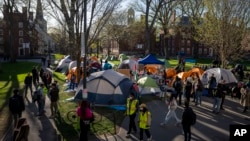
Protesters against the war between Israel and Hamas were voluntarily taking down their tents in Harvard Yard on Tuesday after university officials agreed to discuss their questions about the endowment, bringing a peaceful end to the kinds of demonstrations that were broken up by police on other campuses.
The student protest group Harvard Out of Occupied Palestine said in a statement that the encampment "outlasted its utility with respect to our demands." Meanwhile, Harvard University interim President Alan Garber agreed to pursue a meeting between protesters and university officials regarding the students' questions.
Students at many college campuses this spring set up similar encampments, calling for their schools to cut ties with Israel and businesses that support it.
The Israel-Hamas war began when Hamas and other militants stormed into southern Israel on October 7, killing some 1,200 people and taking 250 hostages. Palestinian militants still hold about 100 captives, and Israel's military has killed more than 35,000 people in Gaza, according to Gaza's Health Ministry, which doesn't distinguish between civilians and combatants.
Harvard said its president and the dean of the Faculty of Arts and Sciences, Hopi Hoekstra, will meet with the protesters to discuss the conflict in the Middle East.
The protesters said they worked out an agreement to meet with university officials, including the Harvard Management Company, which oversees the world's largest academic endowment, valued at about $50 billion.
The protesters' statement said the students will set an agenda that includes discussions on disclosure, divestment, reinvestment and the creation of a Center for Palestine Studies. The students also said that Harvard has offered to retract suspensions of more than 20 students and student workers and back down on disciplinary measures faced by 60 more.
"Since its establishment three weeks ago, the encampment has both broadened and deepened Palestine solidarity organizing on campus," a spokesperson for the protesters said. "It has moved the needle on disclosure and divestment at Harvard."
Chinese students report interrogations, deportations at US airports
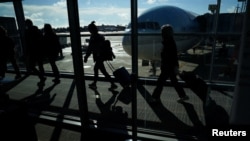
Academics from China are reporting increased scrutiny at U.S. airports, with valid visa holders being interrogated and turned away by Customs and Border Protection Agents.
Phones and laptops have been searched, and researchers have undergone extensive questioning about their work. One graduate student at Yale, who was midway through her PhD, was turned back at Dulles airport and banned from entering the U.S. for five years, according to The Guardian.




